Select Language
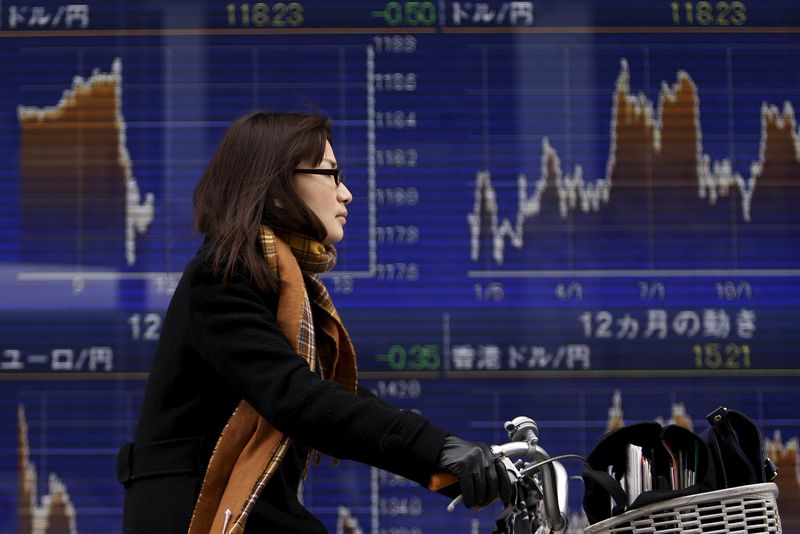
Investing.com-- Most Asian stocks fell on Friday tracking Wall Street’s overnight slump, as investor uncertainty deepened over U.S. trade policies after President Donald Trump postponed 25% tariffs on most Mexican and Canadian goods just two days after imposing them.
Major U.S. stock indices closed sharply lower on Thursday over President Donald Trump’s fluctuating tariff policies.
Trump delays tariffs on Mexico, Canada; sparks broader sell-off
On Tuesday this week, President Trump escalated trade tensions by imposing 25% tariffs on Canadian and Mexican goods, and increasing levies on Chinese products to 20%.
However, he later softened his stance, by delaying 25% tariffs on vehicle imports from Mexico and Canada, offering temporary relief to global markets.
Trump, on Thursday, announced a temporary exemption for goods imported from Canada and Mexico under the United States-Mexico-Canada Agreement (USMCA), delaying the implementation of a 25% tariff until April 2.
The initial imposition of tariffs had already unsettled global markets, and the subsequent postponement has added to the volatility, leaving investors uncertain about future trade relations and economic policies.
Japan’s Nikkei 225 plunged 2.1% on Friday, while TOPIX declined 1.2%.
Australia’s S&P/ASX 200 index fell 1.6%.
Hong Kong’s Hang Seng index inched 0.2% lower, after jumping 3.2% in the previous session.
China’s Shanghai Composite edged 0.1% lower, while the Shanghai Shenzhen CSI 300 lost 0.3%.
South Korea’s KOSPI was trading 0.4% lower, while India’s Nifty 50 Futures edged up 0.2%.
Data barrage next week: CPI data from China and India; revised GDP for Japan
China’s National People’s Congress will conclude on Tuesday. February consumer price and producer price inflation data are scheduled for Sunday, March 9.
India’s February consumer price inflation data is also due next week.
Japan’s fourth-quarter revised gross domestic product (GDP) data is scheduled for release on Tuesday.
“Fourth quarter GDP is likely to be revised downward slightly from 0.7% quarter on quarter, seasonally adjusted, to 0.5% as capital spending comes in weaker than expected,” ING analysts said in a note.
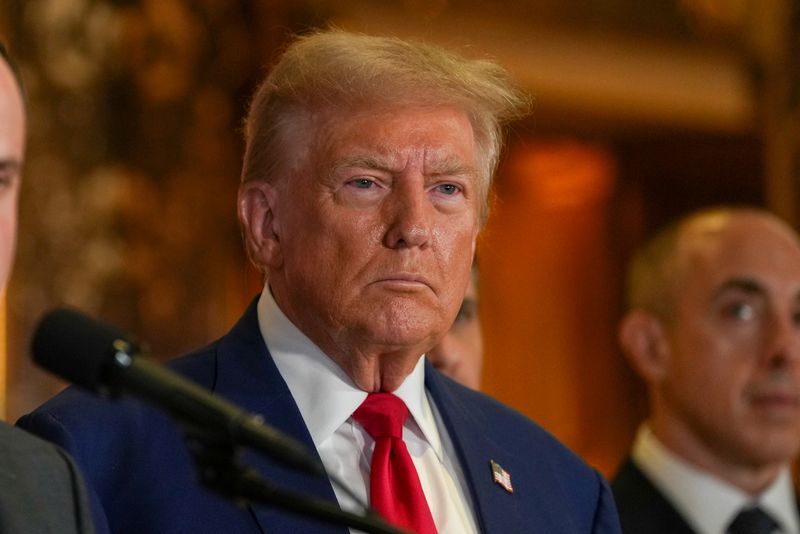
U.S. President Donald Trump has signed an executive order to establish a strategic Bitcoin reserve, White House artificial intelligence and crypto czar David Sacks said on Thursday evening.
The formation of the reserve will not entail any government purchases of crypto, Sacks said, although he did state that the Secretaries of Treasury and Commerce were now authorized to develop "budget-neutral" strategies to buy Bitcoin, as long as the purchases did not cost taxpayer money.
The reserve will be capitalized with Bitcoin seized by the federal government as part of criminal or civil asset forfeitures, Sacks said, and will not involve any new crypto purchases.
The government will not sell any of its Bitcoin deposited into the reserve, Sacks said in a social media post, and the Bitcoin pile will be kept as a store of value, akin to the government’s gold holdings.
Sacks said the government held about 200,000 Bitcoins, which is valued at about $17.3 billion based on Bitcoin’s current price. The world’s largest crypto fell nearly 4% after Sacks’ post and traded around $86,721 by 19:27 ET (00:27 GMT).
Sacks said that there had never been an audit of the government’s Bitcoin holdings, and said that Thursday’s order will also direct a “full accounting” of the government’s digital asset holdings.
Beyond Bitcoin, Sacks said Trump’s executive order will also entail the creation of a U.S. digital asset stockpile, which will be composed of other digital assets seized by the government. This stockpile will also not involve any new purchases of digital assets.
Trump had last week said four other cryptos- Solana, Cardano, XRP, and Ether- will be included in his planned reserve.
The Department of Justice holds a bulk of the U.S.’ confiscated crypto, specifically Bitcoin, and has sold some of its holdings on the open market in intermittent sales. Sacks claimed that these sales were “premature,” and had cost U.S. taxpayers over $17 billion in lost value.
“Now the federal government will have a strategy to maximize the value of its holdings.”
Sacks’ statement comes just before a White House crypto summit, which is scheduled for Friday. The summit is expected to provide more cues on Trump’s plans for crypto regulation, after he ordered his cabinet to explore a regulatory framework for the industry.
The Bitcoin reserve sees Trump deliver on some of his campaign promises of crypto-friendly regulation. But an absence of any government crypto purchases indicates that the reserve will have little actual bearing on crypto markets.
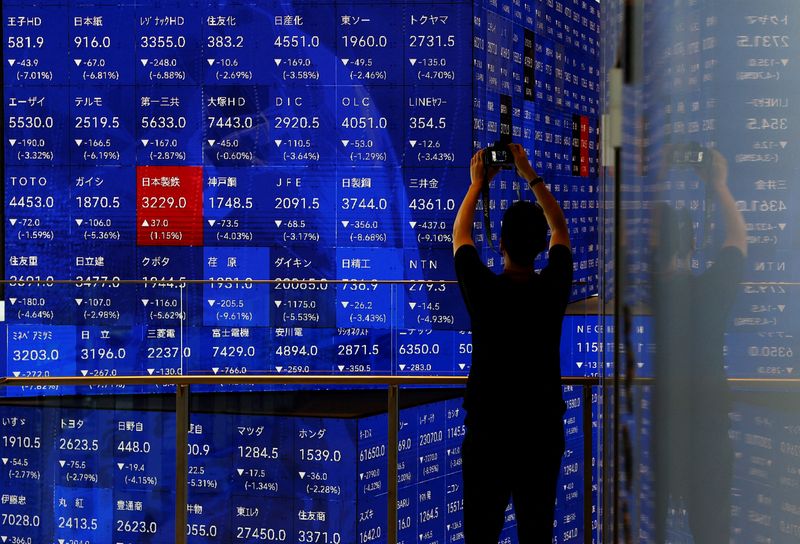
By Rae Wee
SINGAPORE (Reuters) - Investors were met with some calm on Friday after a turbulent week besieged by U.S. trade policy confusion and a global rise in borrowing costs, as a steep selloff in bonds abated and currencies steadied, though stocks tracked Wall Street lower.
Overnight the Nasdaq confirmed it has been in a correction since peaking last December, as U.S. stocks face headwinds from a darkening growth outlook in the world’s largest economy and uncertainty over U.S. President Donald Trump’s tariff policies.
Trump on Thursday suspended the 25% tariffs he imposed this week on most goods from Canada and Mexico until April 2 - the day he has threatened to impose a global regime of reciprocal tariffs on all U.S. trading partners.
Trump’s fast-changing trade policy has sent markets into a tailspin, though currencies like the yen and the Swiss franc, as well as gold, have been among the few assets investors have flocked to as they seek out safety.
The Japanese currency was perched near its strongest level in five months at 147.95 on Friday, on track for a 1.8% weekly gain, while the Swissie scaled a three-month top of 0.8822 per dollar.
Gold prices eased slightly, but at $2,904.62 an ounce, were still not far from a record high. [GOL/]
"The rapidly shifting sands of U.S. tariffs are turning into quicksand for businesses in the U.S., Canada and Mexico to drown in," said Tony Sycamore, a market analyst at IG.
"I’m not particularly confident at this point in time committing money to the market because there is just so much uncertainty out there. It’s a horrible, horrible backdrop for investors to be operating in."
A sharp selloff in European bond markets triggered by Germany’s plans for a huge spending package showed some signs of tapering on Friday, with bund futures jumping more than 0.8% and French OAT futures up 0.7%. Bond yields move inversely to prices.
In Japan, government bonds extended their selloff, though to a smaller degree than in the previous session.
The 10-year Japanese government bond (JGB) yield rose 1.5 basis points to 1.53%, its highest level since June 2009, while the 20-year yield added 2 bps to a more than 16-year high of 2.22%. [JP/]
The surge in European borrowing costs this week has in turn sent the euro on a tear, with the common currency headed for its largest weekly gain in nearly five years on Friday at more than 4%. It last traded 0.07% higher at $1.0794.
The European Central Bank (ECB) on Thursday cut interest rates again but warned of "phenomenal uncertainty", including the risk that trade wars and more defence spending could fuel inflation, raising the prospect of a pause in its policy easing next month.
"The ECB finds itself in a challenging position between the threat of U.S. tariffs in the near-term that could warrant further policy rate cuts - and a move into stimulative territory - and the growing commitment to higher defence spending over the next several years," said Mark Wall, chief European economist at Deutsche Bank.
"This environment requires a deft hand on the monetary policy lever and the preservation of policy optionality."
ASIA STOCKS UPBEAT
MSCI’s broadest index of Asia-Pacific shares outside Japan last traded 0.5% lower, though was on track for a weekly gain of more than 2.5%, which would mark its largest increase in nearly six months.
The rise was helped by a rally in its Chinese counterparts as investors continued to pile into artificial intelligence shares and welcomed new policy support from Beijing.
China’s CSI300 blue-chip index fell 0.2%, but was set to rise 1.5% for the week, while the Shanghai Composite Index was similarly on track for a 1.85% weekly gain.
Hong Kong’s Hang Seng Index rose 0.3% and was headed for a more than 6% surge for the week.
"We expect significant fiscal easing this year, with increased priorities on consumption and high-tech manufacturing, but acknowledge this is different from a ’bazooka’," Goldman Sachs analysts said in a note.
Elsewhere, Japan’s Nikkei slid 1.85%.
Trade tensions aside, the focus for investors on Friday will also be on February’s U.S. nonfarm payrolls report, which will provide further clues on the health of the world’s largest economy.
Expectations are for 160,000 jobs to have been added last month, following January’s 143,000 rise.
Investors have ramped up bets of further Federal Reserve rate cuts this year following a slew of weaker-than-expected U.S. economic data and worries about the impact of Trump’s tariffs, with Fed funds futures now showing just over 77 bps worth of easing priced in this year.
That has in turn sent the dollar on the decline, with the greenback set for a weekly drop of more than 3% against a basket of currencies.
In commodities, Brent futures rose 0.27% to $69.65 a barrel, while U.S. West Texas Intermediate crude futures ticked up 0.2% to $66.49 per barrel. [O/R]

SYDNEY (Reuters) - Australian household spending rose for a fourth straight month in January, driven by a rise in services, although the annual pace of growth slowed, data showed on Friday.
The Australian Bureau of Statistics’ monthly household spending indicator (MHSI) showed a seasonally adjusted rise of 0.4% in January from December, when it rose by 0.2%.
Annual growth, however, slowed to 2.9% from 4.2% in the previous month.
Robert Ewing, ABS head of business statistics, said consumers reduced spending on goods, having already taken advantage of promotional events such as Black Friday sales at the end of last year.
"A 1.5% rise for services drove the January growth. This came as households spent more on health services, air travel, and sports and physical recreation services," Ewing said.
The MHSI series will replace the current retail sales report from July and is much broader in scope covering 68% of household consumption, more than double the retail survey.
It includes spending on many services and should offer a better guide on what to expect from household consumption in the gross domestic product (GDP) report.

By Promit Mukherjee
OTTAWA (Reuters) -Canada’s trade surplus in January exceeded expectations by a wide margin posting a 32-month record as fears of tariffs from the U.S. pushed exports of cars and energy products higher, especially south of its border, data showed on Thursday.
The trade surplus rose to C$3.97 billion ($2.78 billion), more than double the upwardly revised C$1.69 billion seen in December, Statistics Canada said, including a record surplus with top trading partner the United States.
U.S. President Donald Trump slapped a 25% tariff on almost all Canadian imports and after retaliation by Prime Minister Justin Trudeau, he has threatened to stack up more tariffs on them.
On Thursday, Trump agreed to suspend the tariffs for a month provided the products imported into the U.S. comply with the terms of the Canada-U.S.- Mexico free trade agreement.
Canada also rolled back a plan to slap a second round of retaliatory tariffs on the U.S. Its 25% tariff on C$30 billion of goods imported from the U.S. are still in place.
Analysts polled by Reuters had forecast Canada’s trade surplus to be at C$1.28 billion and have said that trade balances would benefit from companies front-loading orders in January.
"This uncertainty is creating major swings in the data, and we are just getting started," Andrew DiCapua, Principal Economist, Canadian Chamber of Commerce.
Total exports increased 5.5% in January to a record of C$74.5 billion, following a 6% increase in December. A 1% decline in the value of the Canadian dollar to its U.S. counterpart in January also led to an increase in export value, it said.
In volume terms, total exports rose 4.5% in January, following an increase of 2.6% in December.
The jump in exports was led by an over 12% jump in motor vehicles and parts, followed by a 4.8% increase in exports of energy products, data showed.
The Canadian dollar was largely stable after the data with the local currency trading weaker by 0.18% to 1.4361 to the U.S. dollar, or 69.63 U.S. cents. Yields on the two-year government bond dropped by 1.1 basis points to 2.544%.
U.S. TRADE
Canada’s trade surplus with the U.S. clocked a record of C$14.4 billion in January, from C$12.3 billion in December. This was led by historically high exports of C$58.2 billion to the U.S. Imports from the United States increased 4.7%, Statscan said.
The trade surplus with the U.S. increased for the third month in a row.
Trump has often indicated that he is unhappy that his country imports more from Canada than it exports and analysts have said that tariffs are also a tool for Trump to reverse this deficit.
However, data shows that its deficit with Canada, which is its second biggest trading partner, is much smaller than its other two top trading partners - Mexico and China.
According to U.S. government data the deficit with Mexico is almost 2.5 times that of Canada, while it is just a fifth of what the U.S. has with China.
Stuart Bergman, chief economist with Export Development Canada said Canada’s surplus with the U.S. shrinks when services trade is taken into account. In services trade, Canada runs a deficit with the U.S.
Services imports for January were down 0.4% on a monthly basis led by a slump in travel services of 5.3%, mainly on lower spending by Canadians traveling to the US, he said.
"This is clear evidence that the current situation is impacting consumer choices," Bergman said.
($1 = 1.4279 Canadian dollars)
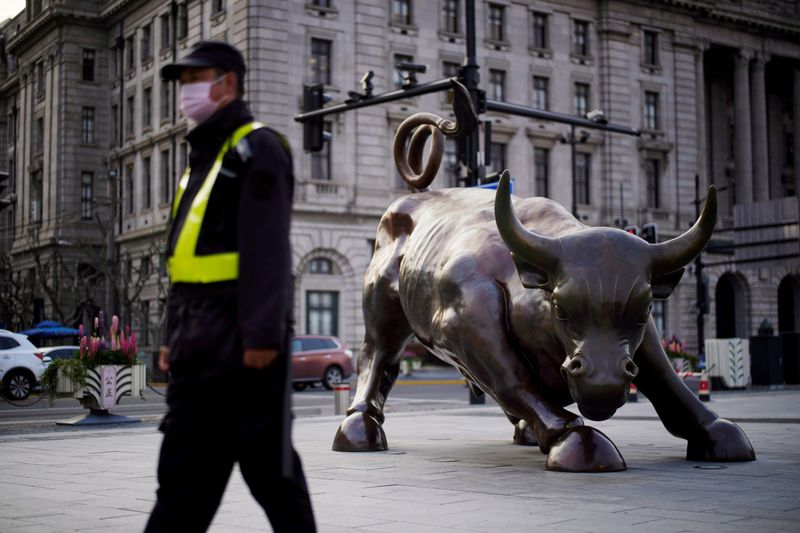
Investing.com-- Most Asian stocks jumped on Thursday led by a surge in Hong Kong shares, as President Donald Trump’s delay of 25% auto tariffs on Mexico and Canada eased immediate trade war fears, while optimism was further boosted by China’s new stimulus measures.
Major U.S. stock indexes jumped on Wednesday, in anticipation that the U.S. administration may be open to tariff negotiations.
Asia stocks jump as Trump’s auto tariff delay signals softer stance
On Tuesday, President Trump escalated trade tensions by imposing 25% tariffs on Canadian and Mexican goods, and increased levies on Chinese products to 20%.
In his congressional speech on Wednesday, Trump reaffirmed plans for reciprocal tariffs, set to take effect on April 2. This move could further escalate trade tensions.
However, the White House announced on Wednesday a one-month exemption from the newly imposed 25% tariffs on vehicle imports from Mexico and Canada, offering temporary relief to global markets.
The White House said Trump is open to considering more tariff exemptions after they took effect Tuesday.
A Bloomberg report showed that Trump is planning to exempt certain agricultural products from the tariffs imposed on Canada and Mexico.
Japan’s Nikkei 225 jumped 1.1% on Thursday, while TOPIX advanced 1.2%.
Indonesia’s Jakarta Stock Exchange Composite Index climbed 1.4%, while the Philippines’ PSEi Composite index rose 1.2%.
Singapore’s Straits Times Index gained 0.6%, while South Korea’s KOSPI was trading 0.9% higher.
India’s Nifty 50 Futures edged up 0.1%.
Bucking the regional trend, Australia’s S&P/ASX 200 index fell 0.6%.
HK shares surge on fresh China stimulus; tech sector leads gains
China announced new fiscal stimulus measures at the National People’s Congress on Wednesday to invigorate its slowing economy, setting a 2025 GDP growth target of approximately 5%.
Premier Li Qiang emphasized enhancing domestic consumption and technological innovation, particularly in artificial intelligence (AI). The government plans to increase the fiscal deficit ratio to 4% to finance consumer goods programs and bolster the tech sector.
The NPC highlighted AI’s importance, mentioning startups like DeepSeek, known for its cost-effective, high-performance AI models. This acknowledgment bolstered investor confidence in the tech sector.
Hong Kong’s Hang Seng index climbed 2.3%, while the Hang Seng TECH index surged 3.2%.
Among HK-listed tech giants, Alibaba’s (HK:9988) stock surged 6.2%, while Tencent (HK:0700) shares climbed 4.7%.
China’s Shanghai Composite rose 0.8%, while the Shanghai Shenzhen CSI 300 index gained 0.9%.
Despite ongoing U.S.-China trade tensions, including recent tariffs and sanctions, China’s commitment to AI and tech innovation has invigorated its stock markets.

HANOI (Reuters) - Vietnam posted a rare monthly trade deficit in February as imports surged during the month, government data showed on Thursday, though the country’s surplus with the United States increased in the opening months of 2025.
The Southeast Asian nation, a regional manufacturing hub, is heavily dependent on export-driven economic growth and faces risks from global trade disputes, including the potential imposition of tariffs by the United States.
Vietnam posted a trade deficit of $1.55 billion in February, after a $3.02 billion surplus in January, the General Statistics Office said. It was only the third monthly deficit since the start of 2023, as per GSO and London Stock Exchange Group (LON:LSEG) data.
February’s exports rose by 25.7% from a year earlier while imports surged by 40%, primarily due to increased imports of dairy products, automobiles and metal products, the GSO said.
Over the January-February period, the GSO said there was a trade surplus of $1.47 billion, aligning with figures published by the government on its portal the previous day.
Combining data for the two months can smooth out distortions from the timing of Lunar New Year holidays, which fell in January this year and February last year.
The GSO data showed that for the January-February period, exports rose by an annual 8.4% and imports were up by 15.9%.
U.S. SURPLUS, CHINA DEFICIT
In the first two months of 2025, Vietnam’s trade surplus with the U.S. reached $17 billion, up 16.3% from a year earlier, while its deficit with China widened by 36.9% to $15.4 billion.
Vietnam is worried about being hit with reciprocal tariffs by the U.S. government. The U.S. is Vietnam’s largest export market, while China is its biggest source of imports.
Vietnam has long been suspected of being a transshipment hub for Chinese goods to the U.S., given the huge volumes of intermediate goods it imports from China.
Other data released by the GSO showed industrial production rose by 17.2% in February from a year earlier, picking up from January’s 0.6% growth, and retail sales rose 9.4%.
Foreign investment inflows rose 5.4% in the January-February period from a year earlier to about $3 billion, and foreign investment pledges rose by an annual 35.5% to $6.9 billion.
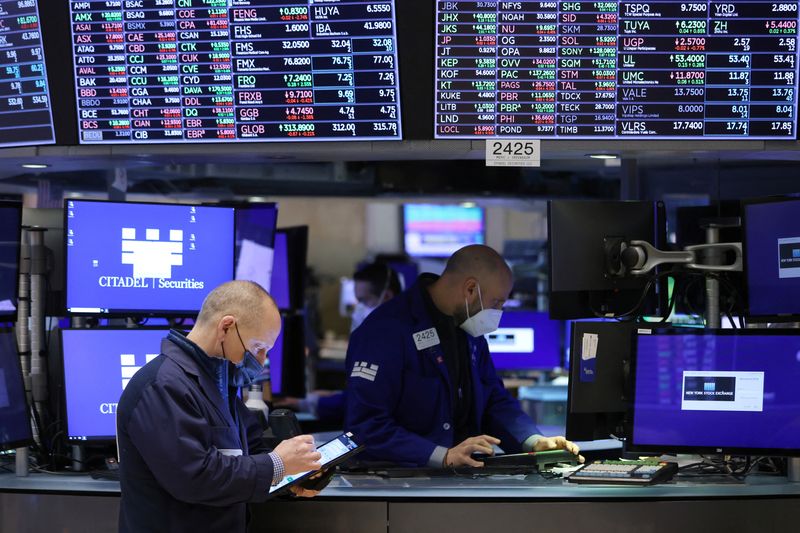
Investing.com-- U.S. stock index futures were little changed on Wednesday evening after Wall Street closed higher driven by President Donald Trump’s decision to grant a one-month exemption for automakers from the newly imposed 25% tariffs on imports from Mexico and Canada.
S&P 500 Futures were largely muted at 5,852.25 points, while Nasdaq 100 Futures inched 0.2% lower to 20,632.75 points by 19:25 ET (00:25 GMT). Dow Jones Futures were unchanged at 43,068.0 points.
Markets get respite as Trump defers auto tariffs
The White House announced on Wednesday a one-month exemption from the newly imposed 25% tariffs on vehicle imports from Mexico and Canada, offering temporary relief to U.S. automakers.
This exemption allows manufacturers additional time to adjust their supply chains and explore long-term solutions, mitigating immediate financial pressures.
Both neighboring countries are integral to the North American supply chain, with numerous parts and vehicles crossing borders multiple times during production. The United States-Mexico-Canada Agreement (USMCA) underscores this relationship, setting content rules that many vehicles already comply with, and ensuring duty-free access.
Meanwhile, Bloomberg News reported that Trump is considering exempting certain agricultural products from the tariffs imposed on Canada and Mexico.
These developments suggest the administration may be open to negotiations for lasting tariff solutions.
The stock market responded positively to the exemption announcement.
The Dow Jones Industrial Average closed 1.1% higher on Wednesday, ending a two-day losing streak. The S&P 500 also advanced by 1.1%, while the NASDAQ Composite climbed 1.5%.
Notably, shares of major automakers jumped, with General Motors (NYSE:GM) advancing 7.2%, and Ford (NYSE:F) climbing 5.8%.
Stellantis NV (BIT:STLAM) shares surged 9.2%, while U.S.-listed Toyota Motor (NYSE:TM) shares jumped 6.5%.
Investors assess services activity data; key jobs report awaited
Data on Wednesday showed that the U.S. services sector experienced unexpected growth in February, with the Institute for Supply Management’s (ISM) Services PMI rising to 53.5 from January’s 52.8, surpassing forecasts.
However, input prices also increased, exacerbated by new tariffs imposed by President Trump’s administration.
These tariffs, coupled with rising raw material costs at factories, suggest inflation may increase in the coming months.
Investors are now keenly awaiting Friday’s employment report, to gauge the health of the U.S. economy, and the Federal Reserve’s future interest rate trajectory.
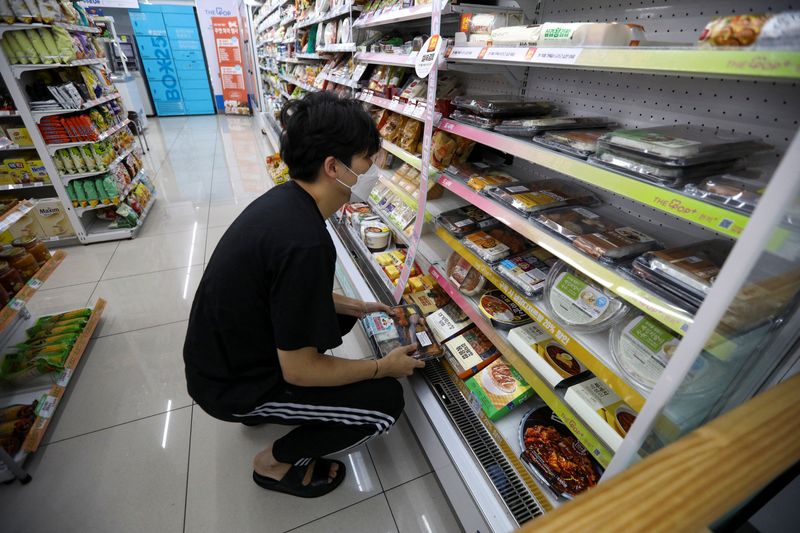
SEOUL (Reuters) - South Korea’s consumer inflation softened in February for the first time in four months, government data showed on Thursday, providing at least some relief to policymakers looking to further ease monetary policy.
The consumer price index (CPI) rose 2.0% from a year earlier, slower than a gain of 2.2% in the previous month, according to Statistics Korea. It was slightly higher than a median 1.95% increase tipped in a Reuters poll.
The slowdown in February came after inflation accelerated in January to a six-month high, driven by a weak won, and above the central bank’s medium-term target of 2%.
The won has strengthened 2% against the dollar this year to trade at 1,444.2 per dollar on Thursday, after weakening more than 12% last year for its biggest drop in 16 years on domestic political instability.
"Going forward, consumer inflation is expected to fluctuate around the target level amid mixed factors of a weak local currency and low demand pressure," the Bank of Korea said after the data release.
Last week, the central bank cut interest rates and said there would be more easing this year, steering Asia’s fourth-largest economy from a restrictive monetary policy stance towards an accommodative one to support growth.
CPI rose 0.3% on a monthly basis, compared with gains of 0.7% in the previous month and 0.2% expected by economists.
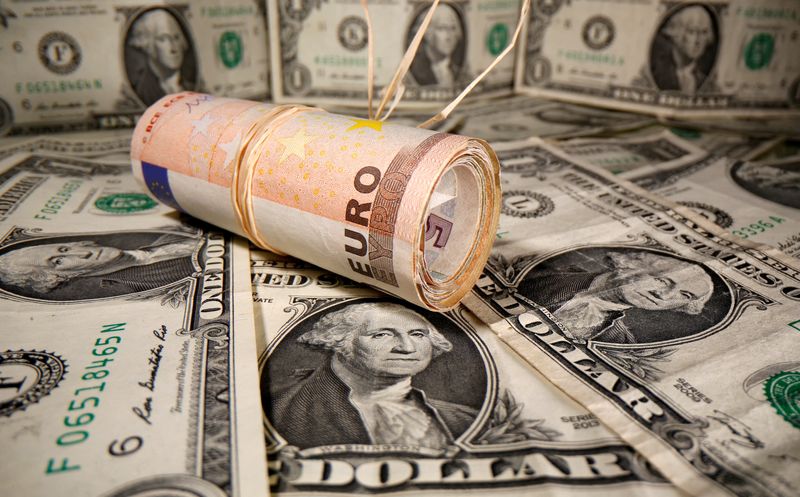
By Gertrude Chavez-Dreyfuss
NEW YORK (Reuters) -The euro ascended to four-month highs on Wednesday against the U.S. dollar, as Europe’s growth prospects improved after Germany’s proposed 500 billion euro ($531 billion) infrastructure fund, potentially offsetting global trade tensions.
The greenback, on the other hand, fell against most currencies, weighed down by an uncertain growth outlook driven by fears about the impact of tariffs on inflation and the economy. Investors are now starting to price in the potential for outright U.S. contraction, with traders on the prediction market Kalshi currently implying a 42% chance of a U.S. recession this year.
"We are experiencing a change in sentiment when it comes to relying on American markets," said Juan Perez, director of trading, at Monex USA in Washington.
"If things are headed towards a restrictive protectionism, the financial system will start making adjustments and right now it seems shedding dollar positions is prudent. If tariffs and trade wars are perceived as negative on the American economy, we return to speculation over the chances for looser monetary policy."
The euro, meanwhile, climbed 4% this week, on track for its best week since November 2022, taking another leg higher after a late Tuesday announcement from the parties hoping to form Germany’s next government of the planned new fund and an overhaul of borrowing rules.
It rose to its highest since November 8 against the dollar and was last up 1.5% at $1.0791, on pace for its best daily gain since November 2023. The euro also gained against other currencies, including the British pound, the Japanese yen and the Swiss franc,.

